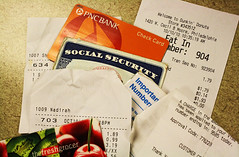With financial pressures mounting, some students are ignoring social stigma and turning to food stamps to make ends meet.
Haniyyah Sharpe, a full-time student who works and interns approximately 30 to 45 hours per week, said she doesn’t want to have to worry about choosing between buying groceries or paying bills.
For Sharpe, and many other full-time students across the country, college costs can be overwhelming. Although part-time jobs offer pocket change, after students pay for tuition, housing and books, sometimes there isn’t much left to make it through the month.
Amid constantly rising tuition costs and the effects of last year’s recession, some colleges and universities are now encouraging students to apply for Supplemental Nutrition Assistance Program benefits, according to a May 2010 report by political news website the Daily Caller.
SNAP – formerly known as food stamps – is designed to help people stay healthy during rough times. According to the United States Department of Agriculture, the new title reflects a higher focus on nutrition.
Sharpe, a sophomore journalism major, is a recipient of SNAP benefits.

“I definitely think it is something students should look into. It’s one less thing to worry about come the first and 15th of the month,” she said.
To receive SNAP benefits, only certain students can qualify, including full-time students who work at least 20 hours per week, full-time single students caring for children younger than age 12, full-time married students caring for children younger than age 6, and at least half-time students who actively work a certain number of hours in a work-study program.
Students who meet the requirements can receive anywhere from $16 to $200 per month for food. The monthly benefit is meant to alleviate pressures of juggling long work hours, classes and homework, and to promote healthy eating habits.
“I think college students do need food stamps,” said Deandra Sheppard-Myers, a senior international business and legal studies major. “Times are hard right now, especially for upperclassmen who live off campus and don’t necessarily have a job or even a meal plan. I think food stamps definitely help.”
Schools such as Pacific University and Portland State University include information on their websites about how students can receive SNAP benefits.
The Pennsylvania Department of Public Welfare’s website offers a program called COMPASS that will determine a perspective applicant’s eligibility without any commitment.
But one word associated with food stamps is causing some students hesitancy toward the program: poverty.
“I always think of poor people – I know that sounds really bad, but honestly, yeah, poor people – and the fact that we pay taxes so they can eat,” said Nina Melito, a sophomore biology major.
Despite the ever-present mantra of the broke college student, some still feel it should be left for community members who can barely make ends meet.
“I think it just should be something for people who have low-incomes,” said Nicholas Mangine, a senior theater major. “I think they are the ones who deserve to get it more so than other people who have it.”
In an attempt by the Pennsylvania Department of Public Welfare to lessen the stigma associated with food-stamp programs, benefits now function like a direct-deposit debit account.
Each month, the government transfers benefits to the account, which can be accessed with an electronic benefits transfer card. Recipients are able to use this card wherever EBT is accepted, however, only food purchases can be made with it. Items such as alcohol, medicine and hot foods cannot be purchased.
The county assistance office closest to Main Campus is on Broad Street and Lehigh Avenue. Students can pick up an application from a SNAP location or fill one out online.
Sharpe said the process isn’t easy.
“It amazes me,” Sharpe said. “Every time I go in the office, I have a new caseworker. They never keep track of clients’ paperwork.”
After that, an interview is set up with the nearest welfare office, where a representative will explain whether a student is approved for benefits.
Danette Coombs can be reached at danette.coombs@temple.edu.
[Full disclosure: Haniyyah Sharpe has written for the Opinion section of The Temple News.]



Excellent article. Hope to see a lot more from Danette Coombs.
This article highlights everything that is wrong with Philadelphia and its culture of entitlement… Able body students and young adults who opt for the easy way out… Fact check the recession has been over for year now, get a job!!!. I worked full-time during college and never asked for a handout. I supported myself, without a single food stamp.
Absolutely pathetic and I am glad I left that city. November 2nd will be a rude awaking for the entitlement class.
Narrow minded thinking! Not everyone feels entitled, and there could come a time when you or someone you know may need some assistance Mr. Jones. Our future circumstances aren’t guaranteed. I’d rather see students seek assistance than to go hungry.
“Handout?” Correction. SNAP (formerly known as food stamps) is not a “charity” program. It is a BENEFIT to taxpayers. Get it right.